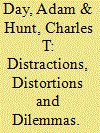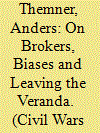|
|
|
Sort Order |
|
|
|
Items / Page
|
|
|
|
|
|
|
| Srl | Item |
| 1 |
ID:
184459


|
|
|
|
|
| Summary/Abstract |
The provision of external state support to non-state armed groups in civil wars is a dynamic process. While we know much about the initiation of external support and its effects, we know less about why state sponsorship changes over time. Based on a within-case analysis of the United States’ support commitment to the armed opposition in Nicaragua in the 1980s, this article demonstrates the utility of focusing on shifts in leaders’ perceptions and domestic attribution processes rather than structural features of the international system or rebel behaviour to understand temporal variation in external support.
|
|
|
|
|
|
|
|
|
|
|
|
|
|
|
|
| 2 |
ID:
184460


|
|
|
|
|
| Summary/Abstract |
This article explores the unintended consequences associated with the protection of civilians (PoC) mandate in United Nations peacekeeping. Drawing primarily on two case studies – the Democratic Republic of the Congo (MONUSCO) and South Sudan (UNMISS) – we advance three lines of argument. First, the gravitational pull of PoC can distract missions from other, often interdependent, priorities. Second, the implementation of PoC can distort intended impacts. Third, these distractions and distortions can combine to produce dilemmas for mission architects, leadership and implementers. We conclude by identifying how these quandaries can ultimately make civilian protection, sustainable peace, and mission exits more elusive.
|
|
|
|
|
|
|
|
|
|
|
|
|
|
|
|
| 3 |
ID:
184458


|
|
|
|
|
| Summary/Abstract |
This article examines the role of junior cadres in rebel group fragmentation. I argue that in a centralised rebel group factions will emerge when leaders block junior cadres’ access to senior decision-making bodies. Junior cadres who want to influence the organisation’s politics therefore face a choice between remaining within the rebel group and exiting it. Factionalising is a way to redress grievances by aggrieved junior cadres who deem peaceful mechanisms for upward mobility ineffective. Using original datasets and personal interviews, I find strong evidence supporting my argument in the case of Palestinian Fatah.
|
|
|
|
|
|
|
|
|
|
|
|
|
|
|
|
| 4 |
ID:
184456


|
|
|
|
|
| Summary/Abstract |
In 2023, Civil Wars will achieve the milestone of its 25th anniversary. Since it was first formed by Caroline Kennedy-Pipe, Clive Jones and others at the University of Leeds back in 1998, the journal has published a broad and diverse range of articles related to the pressing global challenge of intrastate conflict, its causes, dynamics, effects and the responses it has engendered. Over its history, the journal has built a reputation as a specialist outlet for high-quality, interdisciplinary research, in particular on the causes, nature, triggers, dynamics, intensity, termination and the recurrence of civil war, covering a wide range of conflicts across the globe in its pages. We would like to take the opportunity presented by the publication of Vol. 24, No. 1 (2022) to introduce ourselves and outline our editorial vision for the coming years, if that is perhaps not too grand a term.
|
|
|
|
|
|
|
|
|
|
|
|
|
|
|
|
| 5 |
ID:
184461


|
|
|
|
|
| Summary/Abstract |
In this paper I critically discuss the pros and cons of working with research brokers from a political science perspective. I do this by sharing my experiences of collaborating with two types of local “fixers” – cultural and communal brokers. I argue that even if similar approaches risk introducing a number of broker-induced biases, countermeasures can be taken to mitigate their effect: e.g. continuous triangulation, interviewing “sleepers” and asking in-depth questions to exclude interviewees who misrepresent themselves. However, researchers must be aware that working with multiple brokers can also generate methodological and ethical challenges that need to be taken into consideration.
|
|
|
|
|
|
|
|
|
|
|
|
|
|
|
|
| 6 |
ID:
184457


|
|
|
|
|
| Summary/Abstract |
This paper examines the hitherto unexplored subject of nonstate rebels seeking the status of sole representatives. Why do nonstate armed groups seek the status of sole representatives?, What strategies do they employ to achieve the status of sole representatives?, Is the status merely symbolic, or does it fetch tangible benefits? These research questions are explored by treating Sri Lanka’s LTTE as a case study. Primary and secondary data formed the basis of the analysis. The LTTE used three strategies to achieve a hegemonic disposition within the Tamil community. They are: (1) elimination of rival groups, (2) incorporation of some groups, and (3) battlefield efficacy. The rebels used the claim of sole representation to ensure bilateral talks with the government, get the ban on it lifted, and control the proposed interim administrative structure. The strategy worked to a certain extent, but at least partially contributed to its downfall in 2009.
|
|
|
|
|
|
|
|
|
|
|
|
|
|
|
|
|
|
|
|
|